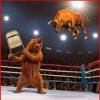And I would say to you that if you followed the money of these same "studies", you would probably find that most of what these studies eventually show had already been decided upon before the study even began, and may have been polluted to make sure of the desired results. Furthermore, many of these same studies are directly linked to the amount of stipend one would receive so that they may continue to "exploit" this particular bias. Because of this, for every study one can produce for one predictive outcome, there are still others that would counter that same study for these same purposes.Think about who controls media spending and power, in turn this shapes consumer spending. A lot of studies were done on this to prove it isn't the other way round.
I can give many instances to counter your example, but let's try this: if the media is so powerful in that it can shape buying habits, how is it when something like gasoline goes to $3.00 a gallon, and we are told that it's going to go the $5.00, that it can go back to $2.00 in spite of the forecast? Where is the power in this example? Of course, the power lies with the consumers decision of reducing their demand of this same product, which increases supply, which then lowers the price. Now, if you're talking about a government run media outlet, I would have to agree with your assessment. But if you're talking a free market society, there isn't a day that goes by where this same logic would be vigorously challenged as to its degree of merit.
Actually, "genuine" democracy works exactly like this. If you read "Popeye's" contribution in this thread, you would realize that a "pure democracy operates by direct majority vote of the people" - which is another way to say that those who have the most toys, wins!As for politics....again think about how much money is required to finance it. Genuine democracy doesn't work this way.
Other than that, you didn't give much else to go on in your reply. So I await any follow up you might have to my response.
No, these are not Democracies or Republics. These are Parliamentary Governments. The main differences between this and our government are 1) Legislatures are responsible only to themselves (the body) and not the people and 2) the Parliament elects the Prime Minister to lead the Parliamentary body, by majority rule, and is not directly voted upon by the people themselves and 3) the "Lower House" proposes law, while the "Upper House" makes the decision to approve or decline the proposal as opposed to the Executive branch having this responsibility (the President).One of the oldest democracy, England has house of Lords and house of Commons akin to our senate and house. The worlds largest democracy by population, India, also has upper and lower houses. The chief executive is the prime minister who has similar role as our president.
Very different in all aspects to that of the United States (or any other country on the planet), with the separation of powers being the most important difference.
Fib













